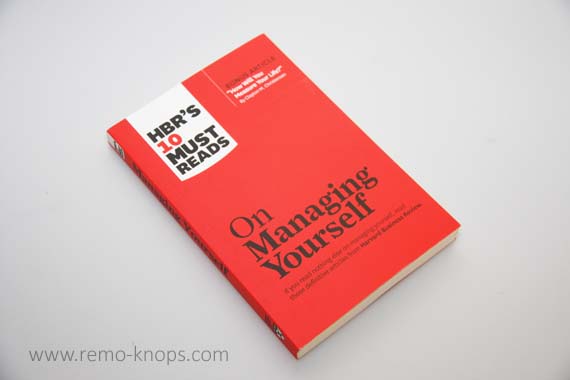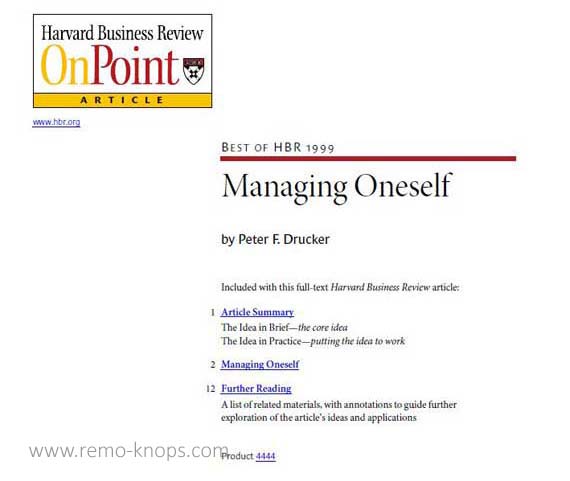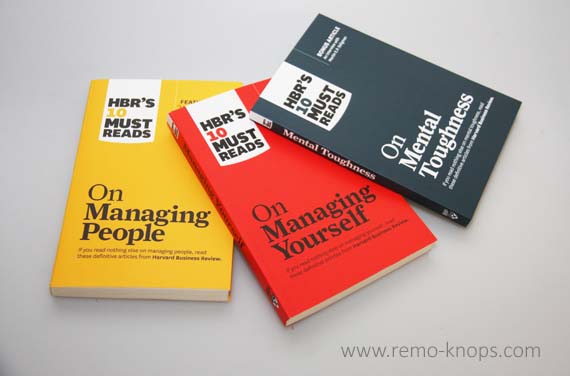As the result of looking a Corporate Effectuation from a personal development perspective, I came across the Managing Oneself Harvard Business Review article from Peter F. Drucker. In this article I will provide a quick overview of Drucker’s main focus points to manage oneself.
“Simply put, it’s up to you to carve out your place in the work world and know when to change your course. And it’s up to you to keep yourself engaged and productive during a work life that may span some 50 years. To do these things well, you’ll need to cultivate a deep understanding of yourself. ” (p. 1)
TABLE OF CONTENTS
Managing Oneself is asking five questions
Peter F. Drucker advises to start with asking yourself the following five questions:
- What are my strengths?
- How do I work?
- What are my values?
- Where do I belong?
- What can I contribute?
While goal might sound relative simple, it requires some thorough analysis, critical attitude and complex decision making. Let’s have a more detailed look at each of the five questions.
Managing Oneself – What are my strengths ?
” […] don’t waste time cultivating skill areas where you have little competence. Instead, concentrate on -and build on- your strengths.” (p. 1)
According to Drucker the only way to discover strengths is through feedback analysis (FA), which will show in a relative short amount of time what your strengths are. Below you can read several implications for action following from the FA:
- Concentrate on your strengths (and put yourself where your strengths can produce results);
- Work on improving your strengths based on the gaps from FA. Improve skills or acquire new ones to realize your strengths;
- Discover where your intellectual arrogance is causing disabling ignorance and over come it.
Furthermore it can help to compare expectations with results in order get an indication of what or what not to do.
“Most companies concentrate on making incompetent performers into mediocre ones.” (p. 4)
In other words those companies don’t allow employees to work from their strengths or simply focus on improving the weak skills.
Managing Oneself – How do I work ?
Someone’s strengths are unique and so is the way how one performs simply because its a matter from personality (no matter if its nature or nurture).
“And how a person performs is a given just as what a persona is good at or not good at is a given.” (p. 4)
Let’s have a look a two specific examples:
A. Am I a reader or a listener ?
Peter F. Drucker uses two examples of well known people not knowing if they are a reader or a listener. Dwight Eisenhower, former supreme commander of the allied forces in Europe, apparently didn’t know he was a reader not a listener. Lyndon Johnson destroyed his presidency by not knowing that he was a listener, not a reader like his predecessor John Kennedy.
Conclusion few readers can be made or can make themselves into competent listeners or the other way around.
B. How do I learn ?
Winston Churchill did poorly at school, simply he was not a reader nor a listener. Winston Churchill learned by writing. Other people learn by talking copious notes, learn by doing or learn by hearing themselves talk. Understand how you learn!
Some people work best as team-members, some people work best alone. Other people work best as subordinates like the used example of General George Patton. Another critical question you may want to ask yourself is whether you perform best as an adviser or as a decision maker?
Peter F. Drucker concludes that “don’t try to change yourself, you are unlikely to succeed, but work hard to improve the way you perform.”
Managing Oneself – What are my values ?
In order to answer the what are my values question, Peter F. Drucker uses the mirror test. “What kind of person do I want to see in the mirror in the morning” (p. 6)
Organizations have (ethical) values as well. In order to perform well or being effective in a organization both the values of organization and individual must be compatible. Value conflicts result in frustration and non-performance.
Managing Oneself – Where do I belong ?
If you answered the first 3 questions (What are my strengths, How do I perform, What are my values) you should be able to decide where you do belong or where you do not belong !
“Successful careers are not planned. They develop when people are prepared for opportunities because they know their strengths, their method of work, and their values.” (p. 7)
And …
“Knowing where one belongs can transform and ordinary person -hardworking and competent but otherwise mediocre- into an outstanding performer” (p. 7)
Managing Oneself – What can I contribute ?
Knowledge workers need to learn to ask themselves a slightly different question: “What should my contribution be?”
- “What does the situation require?
- Given my strengths, my way of performing, and my values, how can I make the greatest contribution to what needs to be done?
- What results have to be achieved to make a difference?” (p. 7)
- “Results should be hard to achieve, they should require stretching;
- Results should be meaningful and make a difference;
- Results should be visible and measurable.” (p. 8 )
Responsibility for relationships
Managing oneself requires taking responsibility for relationships, which consists of two parts:
A. Accept that other people are the same diverse unique individuals as you are yourself.
The MBTI® (Myers-Briggs Type Indicator®) personality type can provide excellent guidance in this respect. “To be effective you have to know the strengths, the performance modes, and the values of your coworkers” (p. 8 ) just like you have them yourself.
The secret here is to understand the people you work with and find complementary strengths, performance modes or values that make the team successful. Another interesting quote is: “Working relationships are as much based on the people as they are on the work.” (p. 8 )
B. Taking responsibility of communication.
When you clearly communicate your strengths, the way you work, your values and proposed contribution, colleagues find it most helpful and respond with the question “Why didn’t you tell me earlier?”.
You want to ask the same information (strengths, performance, & values) to anyone you work with. Communication will really help to build mutual understanding, matching complementary skills, increasing efficiency and building trust.
In my honest opinion these might be the critical drivers for building a culture of high performance organizations, innovation and entrepreneurship as described in the book Corporate Effectuation.
The second half of your life
“Finding a second area -whether in a second career, a parallel career or a social venture- offers an opportunity for being a leader, for being respected, for being a success.” (p. 10) However you must begin managing the second half of your life long before you actually enter it, no matter which of the mentioned forms.
Concluding thoughts and wrap-up
Managing Oneself is an article of just 12 pages, that is an excerpt from the book Management Challenges for the 21st Century (Peter F. Drucker, 1999). Download your copy of the Harvard Business Review article Managing Oneself of Peter F. Drucker.
The Managing Oneself article is still very relevant, despite the publication almost 12 years ago. It can help a professional with personal development and defining the next step in his/her career.
For me personally there are some really interesting parts in this paper that I will use in my personal development plan. Sharing is caring so I really hope it helps you as well.
Enjoy !

About Peter F. Drucker
“Peter Drucker’s career as a writer, consultant and teacher spanned more than six decades. His groundbreaking work turned modern management theory into a serious discipline, and he influenced or created nearly every facet of its application, including decentralization, privatization, and empowerment, and has coined such terms as the “knowledge worker.”
Dr. Peter Drucker cared not just about how business manages its resources, but also how public and private organizations operate morally and ethically within society. He respected the values of education, personal responsibility and businesses’ accountability to society. Dr. Drucker’s true legacy is his insistence on this value system, and its effect on business, society and individual lives.”



